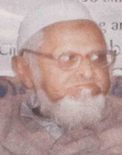
Shibli Nomani was an Islamic scholar from the Indian subcontinent during the British Raj. He was born at Bindwal in Azamgarh district of present-day Uttar Pradesh. He is known for the founding of the Shibli National College in 1883 and the Darul Mussanifin in Azamgarh. Nomani was a scholar in Arabic, Persian, Turkish and Urdu. He was also a poet. He collected much material on the life of the Prophet of Islam, Muhammad but could write only first two volumes of the planned work the Sirat-un-Nabi. His disciple, Sulaiman Nadvi, made use of this material and added to it and also wrote remaining five volumes of the work, the Sirat-un-Nabi after the death of his mentor.

Sulaiman Nadvi was an Indian historian, writer and scholar of Islam. He co-authored Sirat-un-Nabi and wrote Khutbat-e-Madras. He was a member of the founding committee of Jamia Millia Islamia.

Darul Uloom Nadwatul Ulama is an Islamic seminary in Lucknow, India. It was established by the Nadwatul Ulama, a council of Muslim scholars, on 26 September 1898.
Hamiduddin Farahi was an Indian Islamic scholar known for his work on the concept of nazm, or coherence, in the Quran.
Maulana Abdul Majid Daryabadi (16 March 1892 – 6 January 1977) was an Indian Muslim writer on, and exegete of, the Qur'an. Daryabadi was actively associated with the Khilafat Movement; Royal Asiatic Society, London; Aligarh Muslim University, Aligarh; Nadwatul Ulema, Lucknow; Shibli Academy, Azamgarh, and several other leading Islamic and literary organisations. In addition to contributing an extensive commentary on the Qur'an in English, Daryabadi wrote also an independent Tafsir in Urdu published as Tafsir Majidi. He also authored the book Hakeem -ul- Ummat in 1950. He also authored a biography, Muhammad Ali Zati Diary, in 1943. He is highly influenced by Ashraf Ali Thanwi and Hussain Ahmad Madani.

Mahmud Hasan Deobandi also known as Shaykh al-Hind was a Sunni Muslim scholar who was active against British rule in India.

Abul Hasan Ali Hasani Nadwi also spelt Abul Hasan Ali al Hasani an Nadvi affectionately called as Ali Miyan was an Indian Islamic scholar and author of over fifty books in various languages. He was the theorist of a revivalist movement. In particular he believed Islamic civilisation could be revived via a synthesis of western ideas and Islam. He served as the seventh chancellor of the Darul Uloom Nadwatul Ulama.

Muhammad Qasim Nanautavi was an Indian Sunni Hanafi Maturidi Islamic Scholar, theologian and a Sufi who was one of the main founders of the Deobandi Movement, starting from the Darul Uloom Deoband. He is known with the title of Hujjat al-Islam among his followers.
Madrasatul Islah is a traditional Islamic institution of learning and a renowned center of oriental and Islamic studies at Sarai Mir in the Azamgarh district of Uttar Pradesh. It was started by Mawlana Muhammad Shafi in 1908 along with participation of prominent scholars and religious seminaries of the area. The madrassa was established with a different syllabus and ideology than that of Darul Uloom Deoband and Darul Uloom Nadwatul Ulama. Shibli Nomani and Hamiduddin Farahi are regarded as chief architects of this madrasa.
Professor (Maulana) Abdul Bari Nadvi was born in 1886 in the Barabanki district near Lucknow in the UP Province of India. His father Hakim Abdul Khaliq was a student of Maulana Mohammad Naeem Farangi Mahli. His younger brother Saad-ud-Din Ansari was among the founding members of the Jamia Millia Delhi. Abdul Bari Nadwi died in Lucknow on 30 January 1976. He is survived by four sons his name Shamshul Bari Fazlul Bari Ahmedul bari Obaidul Bari and two daughters.
Mohammad Rabey Hasani Nadwi is an Indian Sunni Islamic scholar, who serves as the president of All India Muslim Personal Law Board and the chancellor of Darul Uloom Nadwatul Ulama and patron Islamic Fiqh Academy, India. He is also the Vice President of the Aalami Rabita Adab-e-Islami, Riyadh (K.S.A.), a founding member of Muslim World League. He has been regularly listed among the 500 Most Influential Muslims of the world.
Salman Husaini Nadwi is an Indian scholar and professor in the Islamic sciences. He is an author of numerous scholarly works in Arabic and Urdu. Salman Nadwi served as the Dean of the Faculty of Dawah at the Darul-uloom Nadwatul Ulama madrasa in Lucknow.
Iqbal Ahmed Khan was born in 1884 in village Badhariya, Azamgarh, and died on 7 November 1955. He was a famous Urdu poet, writing under the takhallus, or pen name "Suhail", Islamic scholar, lawyer, educationist and a politician. He was a member of the executive committee of the Azamgarh Muslim Education Society, which manages Shibli National Post Graduate College and other institutions in Azamgarh, Uttar Pradesh. His poetry has been mentioned in many articles about Azamgarh. His work has been featured in the Encyclopedic Dictionary of Urdu Literature. edited by
Mujahidul Islam Qasmi was an Indian Mufti, Qadhi and Islamic scholar, founder of Islamic Fiqh Academy. He served as the President of All India Muslim Personal Law Board.

Atiya Fyzee or Atiya Fyzee-Rahamin; Atiya Begum; Shahinda; Atiya Begum Fyzee Rahamin was an Indian author and the first woman from South Asia to attend the University of Cambridge.
Muhammad Salim Qasmi Siddiqi was an Indian Sunni Muslim scholar who co-founded Darul Uloom Waqf, Deoband.

Zafeeruddin Miftāhi was an Indian Muslim scholar and jurist who served as the thirteenth Grand Mufti of Darul Uloom Deoband and the second president of Islamic Fiqh Academy. He compiled the religious verdicts of Azizur Rahman Usmani, called the Fatāwa Darul Uloom Deoband in twelve volumes and wrote books including Islām Ka Nizām-e-Masājid, Islām Ka Nizām Iffat-o-Asmat and Tārīkh-e-Masājid. He was also a member of Board of Studies at the Sunni Theology department of Aligarh Muslim University.

Muḥammad Ijteba Nadwi was an Indian Islamic scholar, who formerly headed the Arabic departments of Jamia Millia Islamia, Kashmir University and the Allahabad University.








